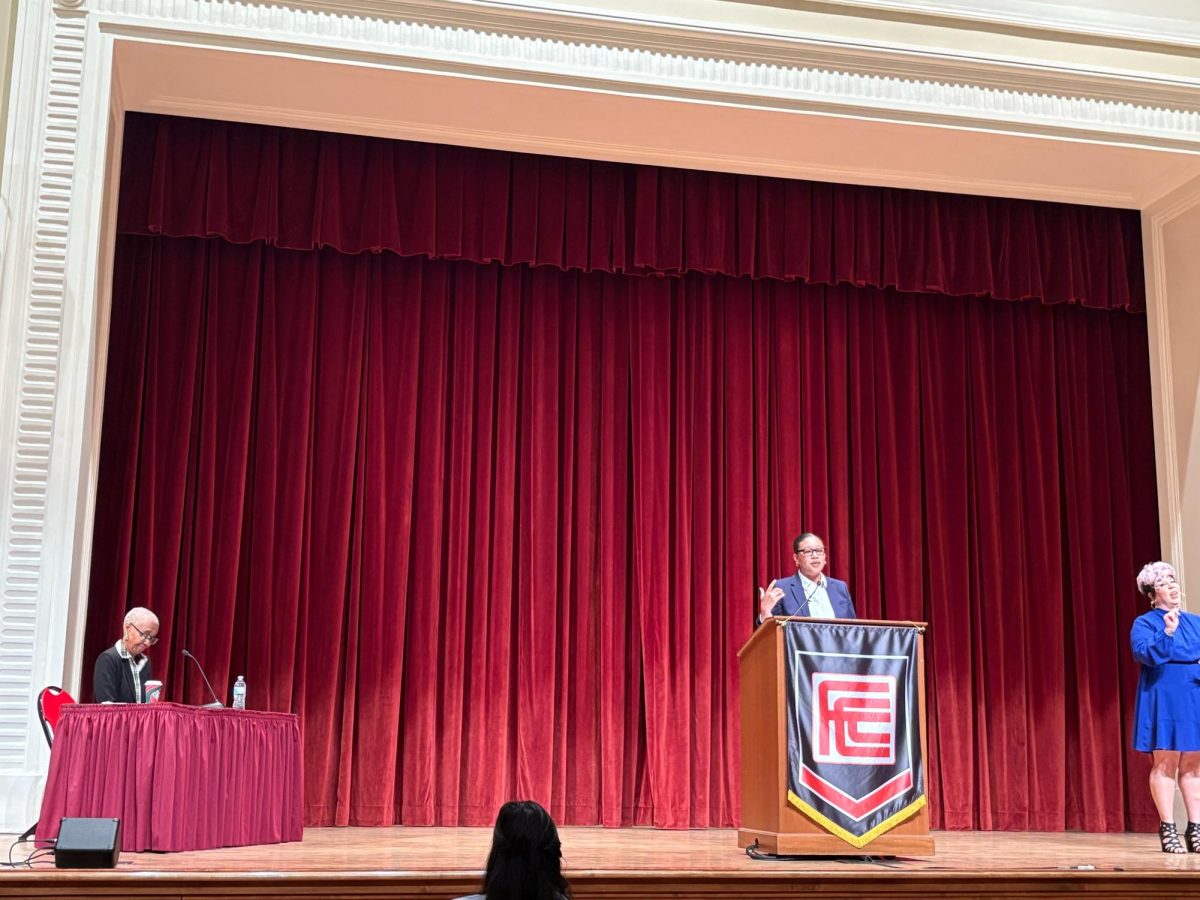When it comes to the college life, eating on campus is a major part of a student’s daily routine. Some colleges have many options to choose from when it comes to food selection. On the Fresno City College campus, two eateries — the Campus Café, adjoining the College Activities office and the Pacific Café, next to the college bookstore – offer a contrast in menu and ambiance.
The Campus Café has a variety of food for breakfast and lunch at recession friendly prices, with sandwiches going for as low as $1.50. The Pacific Café provides Asian inspired foods, such as sushi, as well as smaller items that students may purchase for a quick bite.
But do students know what happens behind the scenes in these cafés? Earlier this year, inspectors from the Fresno County Health Department cited both cafés for health code violations and handed out 11 citations to both, according to a story published in the Rampage in February.
Michael Guerra, Vice President of Administrative Services, said he was aware of the violations and citations against both cafés, because the citations are public domain, but he does not know the severity of each violation.
Guerra does not work with the two cafés directly, but Scott Thomason, Vice President of Administrative services at Reedley College, does. He is responsible for Food Services district wide.
Anita Foust, food service director for Campus Cafe said that her establishment has taken several steps to prevent another violation. Foust displayed for the Rampage the Campus Café’s daily cleaning routine, proper care of the food on display, and the care given to the students.
She is especially proud of the corrections and the steps she’s taken to prevent future violations. Foust explained that a business has 72 hours to correct the violations before another inspection is performed. “If we didn’t fix anything they told us to, we could be fined up to $10,000,” Foust said, as she guided this reporter for a tour of the Campus Cafe’s spotless and organized kitchen.
Faust’s hard work paid off. The Fresno County Health Department found very little need to write a citation to the Campus Café when the inspectors revisited in April. Foust said she is determined to keep up with health codes, making sure that not only the food is clean, but that the environment for the students is clean as well.
Tom Hagihara, owner of the Pacific Café likewise explained the steps he and others must take when running an independently owned café. First, he must take the National Registry of Food Safety Professionals (NRFSP) exam and pass it before he can open an independent restaurant; then, he must renew the license every four to five years.
The license, provided after passing the exam, recognizes its carrier as a “Certified Food Safety Manager,” insuring inspectors, employees, and customers that the holder has the necessary knowledge about food borne illnesses, and cleanliness while handling food. “If you don’t have this license, you don’t have a business to run. I’ve been running this business for 14 years on the college campus,” said Hagihara. He trains old and new employees every three to six months to insure that his business is running as it should, making sure that the café and the food itself is clean and safe for the students.
Despite the recent violations, Hagihara said he ensures that the Pacific Café is quite clean, welcoming and always ready for costumers. He helps out as much as he can and is often mistaken for one of the employees. Hagihara helps in the kitchen with food preparation; he helps with stocking and ordering supplies, all, while still running the business end.
Hagihara explained to the Rampage that sometimes inspection results are quite subjective and depend on the inspector. “The recent inspector is new and is very strict and goes by the book,” he said. “He comes during our busiest hours, which means the refrigerators are constantly opening and closing.”
He also said that the constant opening and closing of the refrigerator leads to a fluctuation of the temperature of the refrigerator. “It’s easy to see it as a violation, and [he] hands me a citation,” Hagihara said. About the specific refrigeration violation, he explained, “It’s like when you are having a party and the front door is constantly opening and closing. The temperature in the room will change, but it doesn’t stay changed for long periods of time.”
Joseph Diebert, an FCC Occupational Health Safety Officer, said that there are a variety of circumstances where a refrigeration unit’s temperature can drop. Factors such as “taking in a delivery, restocking, cleaning, or placement of cooked food items in the unit to be chilled. This could drastically change the ambient air temperature and affect the core temperatures of food items over time,” said Diebert.
If an inspector sees such a difference in a unit’s temperature, this can be classified as a major violation. Though the quick change in temperature looks bad for a moment’s time, the temperature returns to the correct setting shortly after one of the factors is completed. That is, if the refrigeration unit is running properly and without defaults.
In an informal rampage survey of 100 FCC students about which on campus café they preferred, 60 students said they preferred the Pacific Café while 34 students preferred the Campus Café, or the Cafeteria as some students call it. Six students said that would rather eat off campus.
Ninfa Martinez, an FCC student, said that while she prefers to eat at the Campus Café because there is a greater variety of food, failed inspections “do matter because people should be responsible enough to make sure that everything is clean and proper.”
Another student, Dorothy Gunn, prefers the Pacific Café because “their sandwiches are awesome,” but Gunn also has concerns about cleanliness. “I don’t feel comfortable when my kitchen at home is unclean,” she said. “If I’m eating away from home, I expect them to hold those same standards as well.”
Mariano Montellano, Jr. prefers the Pacific Café as well. He said it is cheaper and “The food is great.” However, he said, “If a place fails an inspection, close it, or step up on cleaning.”
Darren Cousineau, SCCCD’s Environmental Health & Safety Director, and Diebert are both aware of every citation the cafés receive. “It is important for people to understand that a restaurant inspection represents a snapshot in time, and violations are typical for the industry,” Cousineau said. “Equally important to understand is that none of the violations identified in the inspection reports constituted an eminent threat to public health or safety; had they, the facilities would have had to cease and desist.”
A review of the health Department inspection of Carl’s Jr. and Taco Bell restaurants, eateries closest to the FCC campus, shows that both were inspected by the same inspector that cited the cafes on the FCC campus but that neither received any major violations.
Diebert told the Rampage that if one were to look up any restaurant in Fresno, one would find that the restaurant has had major and minor violations at some point in time during its normal operations. “Some of the violations that are seen here may come as a shock to some individuals because of the wording as a major violation, but coming from a background as a health inspector, some of these major violations, such as temperature control, are very common and can be explained in some cases,” Diebert said.
The violations and citations made against the cafes on campus were correcte
d within 72 hours, but a spokesperson for the health department said the businesses are due for another round of inspections.
Anita Faust is confident this time around. “We are sure that the inspector will find a clean house. We’re very proud of what we do here and the hard work we put into keeping our kitchen, and our eating areas are safe and clean.”






